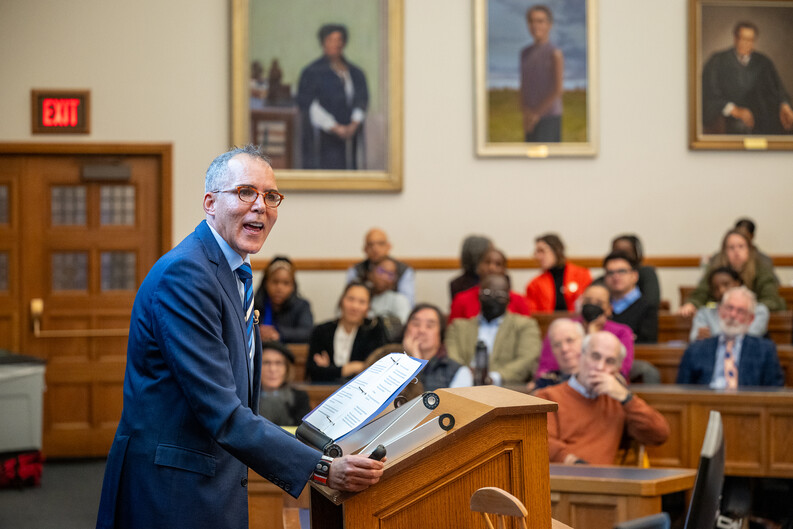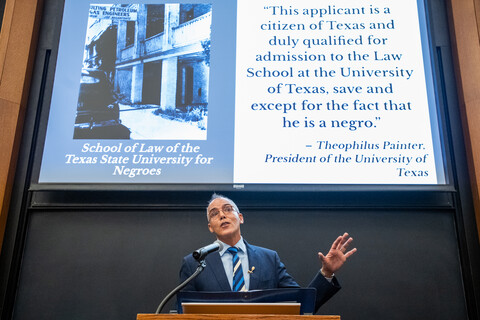Professor Forman Delivers Inaugural J. Skelly Wright Lecture

Professor James Forman Jr.4 ’92 delivered his inaugural lecture as J. Skelly Wright Professor of Law on Feb. 12 to a capacity crowd of colleagues, students, friends, family and community members.
Forman’s lecture, titled “Expanding Access to the Legal Profession after SFFA v. Harvard/UNC,” located the roots of the Supreme Court’s June 2023 decision on affirmative action in college admissions within the history of exclusion across the U.S. educational system, and offered a vision for how law schools might find new ways to open doors to the practice of law.
WATCH THE VIDEO: James Forman Jr. on Expanding Access to the Legal Profession5
In the lecture, Forman discussed how historical moments based in entrenched prejudice have impacted education at the national and local levels, affecting who has and hasn’t joined the legal profession.
“Black lawyers have been vanishingly rare for most of America’s history,” Forman said, citing figures showing that Black people are still dramatically underrepresented in law, compared to other professions like medicine and architecture.
Class also plays a role in the exclusion of historically marginalized communities from the legal profession, he added, pointing to recent research from UCLA law professor Richard Sandor that showed that 39% of law students come from the wealthiest and most educated 10% of American families, while only 5% of law students come from the least wealthy and least educated 25% of families.
“For me, these numbers represent a national crisis,” said Forman. “We are at a time when inequality in this country is sky-high and yet still growing. In the face of that, I think those of us at universities face a simple but stark choice. Do we want to be part of a project that expands economic opportunity? Or do we want to be part of one that further concentrates it?”

Creative thinking and experimentation will be needed to expand access, Forman said. One example is the Access to Law School Program6, which Forman helped found at the Law School in 2020.
Access to Law School is a pipeline program designed for people from the New Haven area who are from groups that are historically underrepresented in the law. Fellows, most of whom are the first in their families to pursue legal careers, receive one-to-one support from Yale Law School students throughout the law school application process. The goal of the program is to empower fellows to thrive in legal studies and in their future careers.
“I lift up [Access to Law] not because it is perfect and certainly not to suggest that one small program is sufficient to meet the setback that is the SFFA decision,” he said. “I offer it to spur our collective thinking, as a way of pushing forward a conversation about the kinds of things that we might do.”
In its first three years, the program has seen its fellows accepted to a wide variety of law schools, including Berkeley, Georgetown, Howard, Quinnipiac, University of Connecticut, Vermont, Villanova, and Yale.
Toward the end of his lecture, Forman issued a call to action for all universities, including Yale, to see their roles as “engines of mobility” and to find ways to open their doors to marginalized communities that can reshape cities for the better.
But he concluded his lecture by directly addressing the students in the room who will help lead the change, urging them to remain hopeful.
“You are going to do something in pursuit of justice, something to expand access to the legal profession, something to advance civil rights and civil liberties in a way that would make Judge Skelly Wright proud,” he said.
The J. Skelly Wright Professorship of Law is named in honor of civil rights icon James Skelly Wright ’61 Hon. LL.D. (1911–1988), who served as a judge on the U.S. District Court for the Eastern District of Louisiana and the U.S. Court of Appeals for the D.C. Circuit. Over the course of his career, Wright worked to strike down racial and economic segregation, curtail sex and employment discrimination, and expand the rights of prisoners, tenants, and low-income people. The professorship, established in 2008, grew out of a teaching fellowship to honor the judge by inspiring students with the ideal of public service.
In her introductory remarks, Dean Heather K. Gerken said few people were as qualified as Forman to take up the professorship named in Wright’s honor.
“[Professor Forman] has used his immense talents and his unflagging energy in the battle against inequity in our criminal justice and education system,” she said. “He is the finest of scholars and the finest of lawyers. And that is because he is the finest of people. He makes it impossible to think that the law is something abstract, that its consequences are numbers, not people, that we are excused from the responsibility to engage directly and think deeply about the harms and plagues our schools and communities and prisons experience.”
Forman has worked as a public defender, representing juveniles and adults charged with crimes. His scholarship focuses on schools, police, and prisons, with a particular focus on the race and class dimensions of those institutions. In 2022, he helped launch the Law and Racial Justice Center7 at Yale Law School, which brings together New Haveners, Yale students, staff, and faculty, local government officials, and local and national experts to imagine and implement projects that advance racial justice.
He is the author of the Pulitzer Prize-winning book Locking Up Our Own: Crime and Punishment in Black America8. His second book, Dismantling Mass Incarceration: A Handbook for Change9, will be published in July 2024.


